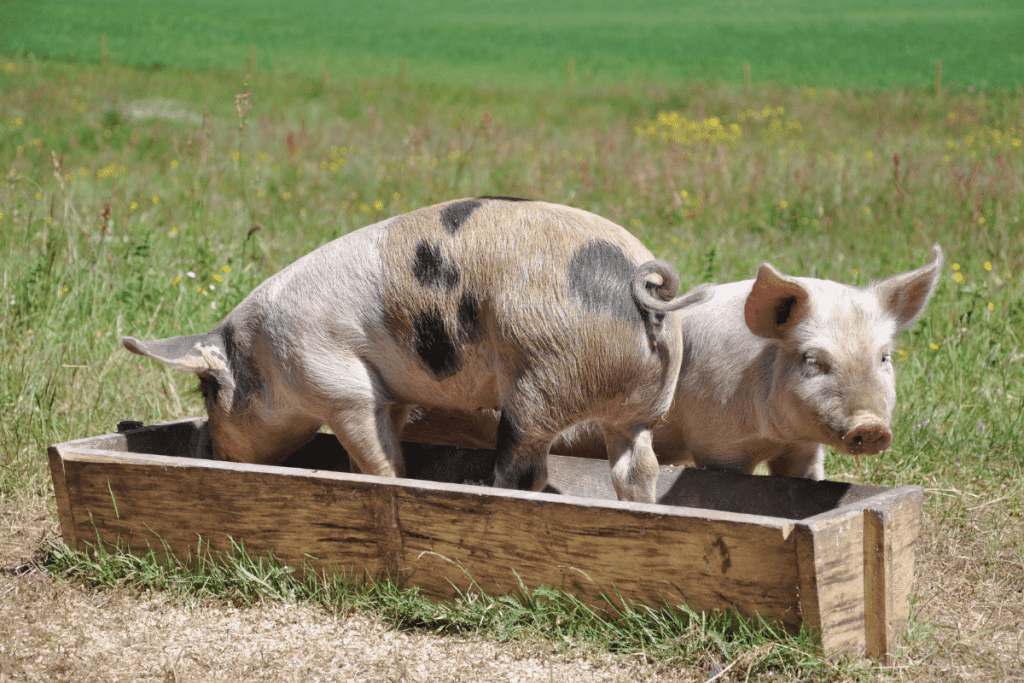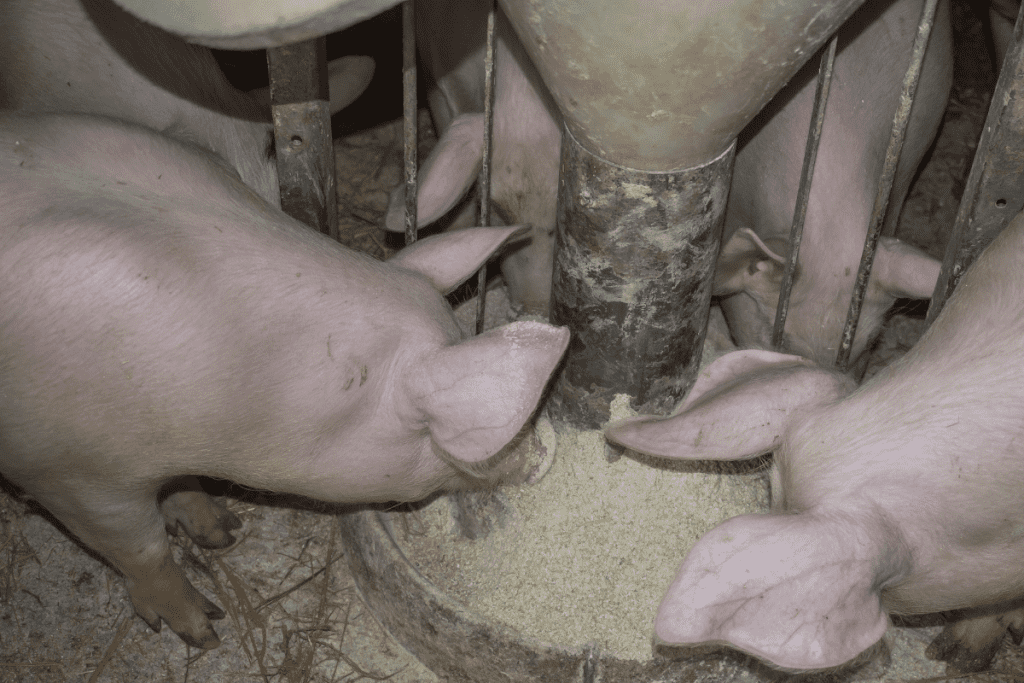If you own pigs, you’ll see them eating their feces at some point.
At first, this is a surprising practice and might make us wonder if there is something wrong with our pigs.
But in reality, it is a perfectly healthy part of pig behavior for them to eat their poop.
Pigs often eat their poop, especially when food is more scarce. When animals eat their feces, it is usually because they are attempting to gain more nutrients from the food by passing it through their digestive systems a second or even third time.
You might wonder if pigs like the taste of poop, whether it’s safe for pigs to eat their poop, why they eat their poop, and more.
This behavior can prompt many questions!
Read on to learn the answers to all of these questions and more.

Table of Contents
ToggleDo Pigs Like Eating Their Poop?
Do pigs eat their poop because they like the taste?
Weirder things have happened in the animal world.
Pigs do not eat poop for the flavor but rather the essential bacteria and undigested feed content they find in poop.
Pigs eat feces because of its nutrient contents, using it to supplement their regular diet.
In addition to their actual feed, they eat poop to access essential bacteria and protein not digested the first time around.
Is it Safe For Pigs to Eat Their Poop?
Unless the feces contain pathogenic bacteria, it is completely safe to eat regular poop.
The nutrient contents of poop can be good for pigs, even in the case of human waste.
Piglet performance is increased by allowing them access to maternal feces, supporting a healthy gastrointestinal tract.
Why Do Pigs Eat Their Poop?
Adult pigs often eat their poop when they have limited access to food.
When they are not getting enough nutrition in their diet, they will use their feces as a food source, passing it through their digestive tract one or two extra times to gain extra nutrients from it.
Pigs will even eat other feces, including human feces, to meet their nutrient requirements.
There are vital nutrients often leftover in feces, and pigs eat this undigested feed content to pass it through their gastrointestinal tract an additional time and digest these extra nutrients.
It’s actually beneficial for pigs to eat their mother’s poop early in their lives!
A study on pig behavior in 2019 found marked differences in piglet growth performance between piglets with access to maternal feces and those who were not allowed to eat animal feces.
This study separated piglets into two groups, one group of control piglets (labeled CON piglets) and one group of piglets deprived of maternal feces (labeled DEP piglets).
One group was allowed to eat maternal feces, and one group was not.
The control piglets, those allowed access to feces from their mother, were heavier than the other piglets and had higher white blood cell counts than the other piglets.
This marked difference in piglet performance shows it is essential for piglets to have access to regular poop for them to eat.
Otherwise, they may become anemic piglets because they are missing vital nutrients.
Do Any Other Animals Eat Their Own Poop?
Pigs are not the only creatures in the animal kingdom willing to eat feces, both their own and those from other species.
Pigs are often highlighted as animals who eat their poop because they are not considered clean animals and have a reputation for being dirty animals.
However, many types of animals and insects eat feces, including human waste.
Among the insects eating poop for essential nutrients are dung flies, dung beetles, and termites.
Rabbits have a system in which they create cecotropes, or “night poop,” which are poops containing large amounts of nutrients.
The rabbits almost always eat this “night poop” immediately after passing them to process the nutrients a second time.
Baby elephants and hippopotami eat maternal feces, much like the control piglets in the study we talked about above.
Just as consuming maternal feces increased piglet performance, consuming maternal feces serves a similar purpose in other species.
Additionally, rodents like hamsters and guinea pigs also eat their feces.
The hypothesis here is their droppings contain B and K vitamins essential for the health of the animals.
Even gorillas sometimes eat their feces.
It is quite normal for animals to eat poop.
It’s almost to the point where humans are weird for not doing it!
How Do I Stop My Pig From Eating Poop?

First, it is important to understand it is perfectly healthy for pigs to eat poop as long as it doesn’t contain pathogenic bacteria.
However, if you don’t want your pigs eating poop, there are a few ways to prevent it.
The first way to keep your pigs from eating poop is to provide plenty of food with high nutrient contents, so they do not feel malnourished.
While it is fine for pigs to eat poop, it is a sign they are not feeling full and may not be getting their nutritional needs met.
Supplementing their diet with pig pellets, fruit, and vegetables will help them feel more satisfied.
Additionally, if you are not feeding them 2-3 times a day, you should adjust their feeding schedule to eat multiple times per day.
Increase your pig’s access to pasture to limit their poop intake.
If they have more space to run around in, their poop will be more spread out, and they may be less tempted to eat it.
Keep their sty or pasture cleaner by picking up their poop once a day, which will help prevent them from eating it.
How to Tell if Your Pig’s Poop is Healthy or Not
Your pig’s poop can tell you a lot about their health.
Examine each poop pile for the color, texture, and size to see how your pig’s digestion is working.
Firstly, your pig should be pooping about three times a day.
If they are pooping less often, they are likely constipated, which could mean they need more fiber or water in their diet.
Solve this problem by providing more access to pasture with grass and other fiber-rich dietary supplements, as well as making sure to keep their water troughs clean and full at all times.
Treat constipation with about a tablespoon of mineral oil or even simply by feeding them prunes or pumpkins, which help with constipation because of their high fiber content.
If your pig is straining to poop or is not producing poop at all, they may have an obstruction in their bowel.
Their intestines may be twisted, which is a medical emergency.
In this case, you should call your veterinarian immediately.
Poop Color Determines Health
You should also examine your pig’s poop for color.
Black poop can mean your pig has internal bleeding in their stomach or small intestine, while bright red poop can indicate bleeding in the large intestine or rectum.
However, black stool is not always a cause for concern because it’s also caused by eating dark-colored foods like blackberries.
Additionally, if your pig has accidentally gotten into anything containing bismuth, like Pepto-Bismol, this may make their stool black as well.
Light-colored poop is also a problem because it can indicate a problem with bile production or flow.
Bile is what makes our poop brown, so if your pig’s poop is white or yellow, it could mean your pig is having problems with its bile ducts.
In addition to the consistency and color of their poop, you should also regularly inspect your pig’s poop for signs of intestinal parasites.
Often, when pig poop looks strange, it is caused by a parasite like worms.
Usually, if your pig has worms, you will be able to see little pieces of the worms in their poop.
Most of them will look like white strings in the poop piles.
It is important to detect intestinal parasites as soon as possible and to have your veterinarian de-worm your pig.
Worms can make it impossible for pigs to absorb the necessary nutrients and vitamins they require to survive.
Therefore, it is important to treat worms as soon as the problem arises.
Related: Can pigs eat meat?
How useful was this post?
Click on a star to rate it!
We are sorry that this post was not useful for you!
Let us improve this post!
Tell us how we can improve this post?
